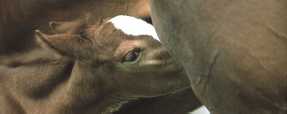The Suckling
Research has suggested that mineral intake from milk and pasture alone, in the first three weeks, is insufficient to meet the foal’s requirements.
For this reason, the foal utilises mineral stores accumulated in the liver whilst in utero, to meet the demands of this early developmental stage. Clearly, if the mare hasn’t received a balanced diet throughout pregnancy, there may be a deficiency which, without additional nutritional support, could result in developmental problems during the foal’s first three months of life).

The foal is entirely reliant on its mother’s milk for these first three months, before the enzyme activity of its digestive tract has developed to enable the digestion of starches and proteins found in cereals and forage (see graph). This is why the quality and availability of that milk is so crucial and influences the foal’s growth rate and body condition. An abundance of poor quality milk (low mineral content) may cause a growth spurt in the foal which, with insufficient minerals to support that growth, may result in developmental problems. Similarly, if the mare is unable to produce enough milk to support a steady growth rate, the foal’s growth may be compromised and he may struggle to maintain body condition.
Preparation for Weaning
Gradually weaned foals exhibit less stress than abruptly weaned ones and associated management should include the introduction of the intended weaning ration from 3 to 4 months of age. Not only will this encourage the maturation of the digestive tract and its adaptation to a forage and cereal-based diet, but it will also help support a more even growth rate. At around 4 months, the dam’s milk will only be providing about 30% of the foal’s energy requirements so it’s also timely to introduce concentrate feed at this point. The aim should be for the youngster to be well established on this feed prior to the time of separation from the dam, to reduce the problems of dietary set-backs post weaning.
Feeding Advice
- Without individual analysis, the exact composition of each mare’s milk is not known so nutritional support for the foal is advisable to avoid deficiencies and support correct growth.
- Foal Creep Pellets provide a balance of nutrients for those foals requiring help maintaining condition, whilst Foal Assist supplies vitamins and trace minerals without additional calories.
- Regular monitoring of the foal’s bodyweight, through use of a weightape and Growth Monitoring Chart, will show the rate of growth and identify any deviations which may indicate an adjustment to the foal’s diet is required.



